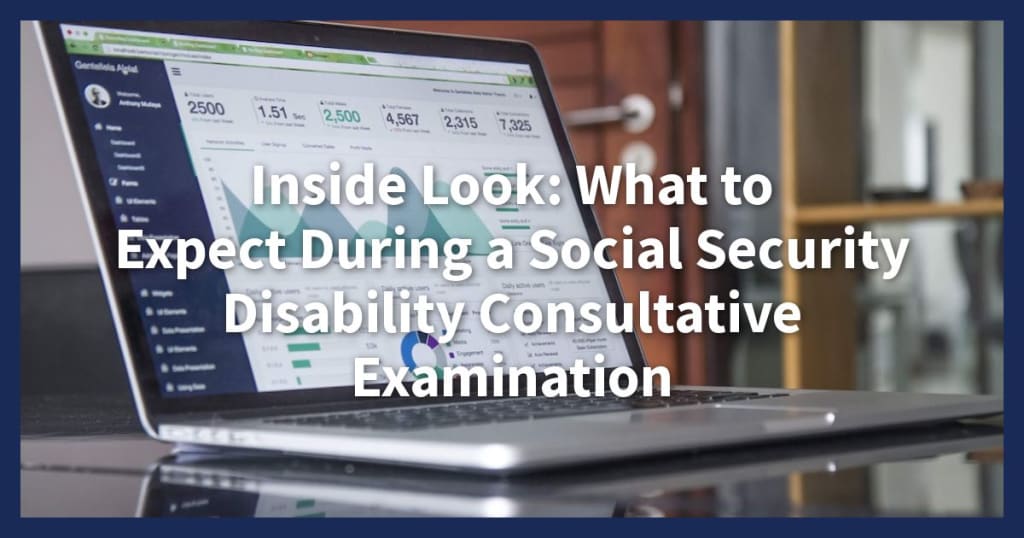Inside Look: What to Expect During a Social Security Disability Consultative Examination
Come prepared and be prepared to document everything the consultative doctor does during the visit.

Inside Look: What to Expect During a Social Security Disability Consultative Examination
Facing a Social Security Disability Consultative Examination can feel daunting, especially if you're not sure what to expect. Let's make this easier. This blog post will give you a clear, inside look at what happens during this critical process. You'll learn about the purpose of the examination, who performs it, what they'll ask, and what they'll observe. We'll also touch on the role this exam plays in your disability claim decision. Just remember, preparation is key to facing any challenge. By knowing what to expect, you can approach your Consultative Examination with confidence.
Inside Look: What to Expect During a Social Security Disability Consultative Examination
What is a Social Security Disability Consultative Examination?
In the process of applying for Social Security Disability benefits, you may be required to undergo a Social Security Disability Consultative Examination (CE). This examination serves as an essential step in evaluating your claim and determining your eligibility for disability benefits. In this section, we will take an in-depth look at what a Social Security Disability Consultative Examination entails, its purpose, and the professionals responsible for conducting it.
Definition and Purpose
A Social Security Disability Consultative Examination is a medical evaluation designed to provide objective evidence about your medical condition(s) and how they impact your ability to work. The purpose of this examination is to gather additional information that may be missing from your medical records, or to clarify any inconsistencies or uncertainties regarding your disability claim. It helps the Social Security Administration (SSA) make an informed decision regarding your eligibility for disability benefits.
During the consultation, a healthcare professional, typically a doctor or specialist, will conduct a thorough examination tailored to your specific impairments and limitations. The examination may include a review of your medical history, a physical examination, diagnostic tests, and any other assessments deemed necessary to evaluate the severity and impact of your medical condition(s).
Who Conducts the Examination?
Social Security Disability Consultative Examinations are performed by licensed healthcare professionals who have been contracted by the SSA. These professionals are independent evaluators, meaning they are not affiliated with your regular treating physicians. Their role is to provide an unbiased evaluation of your medical condition(s) based on the criteria set forth by the SSA.
The healthcare professional conducting the examination will have expertise in the relevant medical field relating to your disability claim. For example, if you have a musculoskeletal condition, an orthopedic specialist may be assigned to perform the consultative examination. This ensures that the evaluator possesses the necessary knowledge and experience to accurately assess your specific impairments.
It is important to note that the purpose of the Social Security Disability Consultative Examination is not to provide treatment or ongoing medical care. The primary focus is to gather objective medical evidence to help the SSA evaluate your claim. Therefore, it is crucial to be honest and forthcoming during the examination, providing accurate information about your symptoms, limitations, and medical history.
By understanding the definition and purpose of a Social Security Disability Consultative Examination, as well as the professionals responsible for conducting it, you can approach this step of the disability evaluation process with confidence. As the next sections will reveal, knowing what to expect during the examination itself can further alleviate any concerns or uncertainties you may have.
Inside Look: What to Expect During a Social Security Disability Consultative Examination
Why is a Consultative Examination Necessary?
When applying for Social Security Disability benefits, you may be required to undergo a Consultative Examination (CE). This examination is an essential part of the disability determination process and plays a crucial role in evaluating the severity of your condition. In this section, we will explore the reasons why a Consultative Examination is necessary and how it helps establish the medical evidence needed for your disability claim.
Establishing Medical Evidence
To qualify for Social Security Disability benefits, you must provide sufficient medical evidence of your disability. This evidence helps substantiate the existence and severity of your condition, demonstrating how it affects your ability to work. However, in some cases, the information provided in your application may be incomplete or insufficient to make a proper determination.
A Consultative Examination fills this gap by providing additional medical evidence. This examination is conducted by a qualified healthcare professional who specializes in assessing individuals with disabilities. The examiner will thoroughly evaluate your medical condition, review your medical history, and may order further tests or diagnostic procedures to gather the necessary evidence.
During the Consultative Examination, the healthcare professional will document your symptoms, assess your limitations, and provide an expert opinion regarding the severity of your condition. This comprehensive evaluation helps ensure that the Social Security Administration (SSA) has a complete picture of your disability and its impact on your daily life and work abilities.
Evaluating the Severity of Your Condition
One of the primary goals of the Consultative Examination is to evaluate the severity of your condition. The SSA considers the extent to which your impairment(s) limit your ability to perform basic work activities. This evaluation is crucial in determining whether you meet the eligibility criteria for disability benefits.
The examiner will assess various factors, including the frequency and duration of your symptoms, the impact of your condition on your ability to walk, stand, sit, lift, carry, and perform other physical activities. They will also evaluate the effect of your disability on your mental and cognitive capabilities, such as concentration, memory, and understanding.
By conducting a Consultative Examination, the SSA ensures that the disability determination process is fair and unbiased. The examination provides an independent evaluation of your condition, helping the SSA make an informed decision based on objective medical evidence.
In conclusion, a Consultative Examination is necessary to establish the medical evidence required for your Social Security Disability claim. It helps fill any gaps in your application, provides a comprehensive evaluation of your condition, and aids in determining the severity of your impairment. By undergoing this examination, you increase your chances of receiving the disability benefits you rightfully deserve.
How to Prepare for a Consultative Examination
When it comes to a social security disability consultative examination, preparation is key. Making sure you have all the necessary information and documentation can greatly improve your chances of a successful outcome. In this section, we will explore three essential steps to help you prepare for your consultative examination.
Review Your Medical Records
Before attending a consultative examination, it is crucial to review your medical records thoroughly. Familiarize yourself with the details of your medical history, including any diagnoses, treatments, and medications you have received. This will help you provide accurate and comprehensive information during the examination.
Take note of any specific medical tests or procedures you have undergone, as well as the dates and results. Highlight any significant changes in your health condition or any new symptoms that have emerged since your last medical evaluation. Being well-informed about your medical history will enable you to answer questions confidently and provide a clear picture of your current health status.
Make a List of Your Symptoms and Limitations
Another essential step in preparing for a consultative examination is compiling a detailed list of your symptoms and limitations. Take some time to reflect on your daily life and jot down any challenges you face due to your health condition. Consider how your symptoms affect your ability to perform tasks such as walking, sitting, standing, lifting, or concentrating.
Be specific and provide examples to illustrate the impact of your symptoms on your daily activities. For instance, if you experience chronic pain, describe its intensity, frequency, and how it hinders your ability to work or engage in social activities. By providing a comprehensive list of symptoms and limitations, you can ensure that the consultative examiner fully understands the extent of your impairment.
Bring Relevant Medical Documentation
To support your claims during the consultative examination, it is essential to gather and bring relevant medical documentation. This may include medical reports, test results, imaging scans, or any other evidence that validates your medical condition and its impact on your daily life.
Organize your documentation in a logical and easily accessible manner, so you can provide it promptly when requested by the examiner. It is also advisable to make copies of your documents to retain for your own records.
By bringing comprehensive and relevant medical documentation, you can reinforce your case and provide the examiner with a more thorough understanding of your condition.
Remember, preparation is key when it comes to a social security disability consultative examination. By reviewing your medical records, making a list of your symptoms and limitations, and bringing relevant medical documentation, you can approach the examination with confidence and increase your chances of a favorable outcome.
Inside Look: What to Expect During a Social Security Disability Consultative Examination
What Happens During a Consultative Examination?
If you are applying for Social Security Disability benefits, you may be asked to undergo a Consultative Examination (CE). This examination is carried out by a healthcare professional who has been contracted by the Social Security Administration (SSA) to assess your medical condition and limitations. In this section, we will explore the various aspects of a Consultative Examination, including the physical examination, medical tests and assessments, as well as the questioning and interviewing process.
Physical Examination
During a Consultative Examination, you can expect to undergo a thorough physical examination. The healthcare professional will assess your overall physical condition, examining areas related to your disability or impairments. This may include checking your range of motion, muscle strength, reflexes, and sensory perception. The purpose of the physical examination is to gather objective evidence regarding your medical condition, which will help the SSA in evaluating your disability claim.
Medical Tests and Assessments
In addition to the physical examination, you may also be required to undergo certain medical tests and assessments during the Consultative Examination. These tests can vary depending on your specific medical condition and the nature of your disability. Some common tests that may be conducted include X-rays, blood tests, EKGs, or other diagnostic procedures. These tests aim to provide the healthcare professional with a better understanding of your medical condition and its impact on your ability to work.
Questioning and Interviewing
Another important component of the Consultative Examination is the questioning and interviewing process. The healthcare professional will ask you a series of questions to gather information about your medical history, symptoms, limitations, and daily activities. It is crucial to provide accurate and detailed responses to these questions, as they will help the SSA in making an informed decision about your disability claim. Be prepared to discuss your medical treatments, medications, and any previous surgeries or hospitalizations related to your condition.
During the interview, the healthcare professional may also inquire about your work history and job duties. They may ask about the physical and mental demands of your previous job(s) and how your disability affects your ability to perform those tasks. This information will play a significant role in determining your eligibility for Social Security Disability benefits.
In conclusion, a Consultative Examination is a crucial step in the Social Security Disability application process. This examination allows a healthcare professional to assess your medical condition, perform necessary tests, and gather information about your limitations. By understanding what happens during a Consultative Examination, you can be better prepared for this important evaluation.
Inside Look: What to Expect After a Consultative Examination
Once you have completed your consultative examination for Social Security Disability, the next step in the process is to wait for the examiner's report and consider the impact it may have on your disability claim.
Waiting for the Examiner's Report
After your consultative examination, you will typically have to wait for the examiner to write a detailed report about their findings. This report is an important piece of evidence that will be used to evaluate your disability claim. The examiner will provide their professional opinion on your medical condition, limitations, and ability to perform work-related activities.
During this waiting period, it is natural to feel anxious or uncertain about the outcome. However, it's important to remember that the examiner's report is just one part of the overall evaluation process. The report will be considered along with other medical evidence, such as your medical records and any additional documentation you have provided to support your claim.
While waiting for the examiner's report, it can be helpful to stay proactive and gather any additional medical evidence that may strengthen your case. This could include obtaining updated medical records, test results, or statements from your treating physicians. By doing so, you can ensure that the examiner has all the necessary information to make an accurate assessment of your disability.
Impact on Your Disability Claim
The examiner's report plays a significant role in the determination of your disability claim. It provides valuable insight into your medical condition and how it affects your ability to work. The report will be carefully reviewed by the Disability Determination Services (DDS) team, who will consider it alongside other evidence when making a decision on your claim.
If the examiner's report supports your claim and aligns with the other medical evidence, it can greatly strengthen your case. It provides an unbiased professional opinion that reinforces your assertion that you are unable to perform substantial gainful activity due to your disability.
On the other hand, if the examiner's report is not favorable or raises concerns about the severity of your condition, it does not necessarily mean that your claim will be denied. The DDS team will still take into account the entirety of the evidence before making a final decision. It is possible to challenge or provide additional information to address any inconsistencies or concerns raised in the report.
In summary, the waiting period after a consultative examination is a crucial time in the disability claim process. It is essential to remain patient and proactive while waiting for the examiner's report. Understanding the impact of the report on your claim can help you navigate the next steps and ensure that you have the strongest case possible.
Conclusion
In conclusion, undergoing a Social Security Disability Consultative Examination (CE) can be a crucial step towards obtaining the benefits you deserve. This inside look into what to expect during a CE has provided valuable insights into the process. From understanding the purpose of the examination to preparing for it, we've covered it all.
Remember, the CE is conducted by a medical professional who will evaluate your condition and provide their expert opinion to the Social Security Administration. It is essential to be honest, detailed, and transparent during the examination to ensure an accurate representation of your disability.
Although the CE can be an intimidating experience, being well-informed can help alleviate some of the anxiety. By familiarizing yourself with the process, gathering necessary documentation, and seeking legal guidance if needed, you can approach the CE with confidence.
Ultimately, the goal of the CE is to gather additional medical evidence to support your disability claim. So, stay proactive, be prepared, and trust in the process. With the right approach, you can increase your chances of a favorable decision and secure the Social Security Disability benefits you deserve.
About the Creator
Jason Baril
Hello, everyone! My name is Jason Baril, and I'm excited to share my story with you all. attorney, I have a few passions that keep me busy - law, pickleball, technology, and writing.






Comments
There are no comments for this story
Be the first to respond and start the conversation.